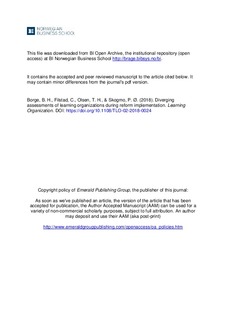Diverging assessments of learning organizations during reform implementation
Journal article, Peer reviewed
Accepted version
Permanent lenke
http://hdl.handle.net/11250/2571766Utgivelsesdato
2018Metadata
Vis full innførselSamlinger
- Publikasjoner fra CRIStin - BI [1015]
- Scientific articles [2181]
Sammendrag
Purpose
This study aims to explore whether hierarchical position and organizational size affect perceptions of a learning organization (LO) during reform implementation.
Design/methodology/approach
An electronic survey was distributed in four Norwegian police districts at an early stage of reform implementation. One of the objectives of the reform was to develop the police toward being more knowledge-based, and there had been specific calls for the police to become a LO. The 753 respondents were top managers, middle managers and employees.
Findings
Respondents rated their organizations lower than benchmark scores on supportive learning environment, learning processes and practices and leadership that reinforces learning. The perceptions diverged across hierarchical levels: middle managers and top managers gave higher scores to the organization as a learning one than employees did. Respondents from large police districts gave higher scores to their organizational units as LOs than respondents from small police districts.
Research limitations/implications
The study captures perceptions of characteristics of a LO at one point in reform implementation, and further studies are needed to fully understand explanations of diverging views within an organization as to whether it can be characterized as a LO.
Practical implications
Actual differences in local learning practices or different assessments of learning practices within the organization should be considered when developing LOs.
Originality/value
The study contributes to our knowledge of LOs by showing diverging views within the same organization in a context of reform implementation.
